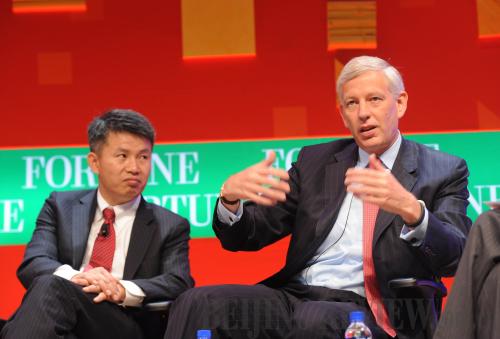|
 |
|
MY VIEW: Dominic Barton, Managing Director of McKinsey & Co., speaks at a panel discussion on China's changing economy at the 12th Fortune Global Forum held in Chengdu, southwest China's Sichuan Province, on June 7, 2013 (XUE YUBIN) |
At the local level, McKinsey undertook a research program on "promoting a new type of industrialization" for southwest China's Sichuan Province during its drafting of a local five-year plan for 2011-15.
"The transitions Chinese companies are going through provide us with a lot of opportunities," said Gong Li, the Greater China Chairman of Accenture, another global consulting firm. Li said that the past decade has been a key stage for the deepening of China's economic restructuring and the climb up the global value chain by Chinese companies.
Chinese clients' consulting demands from Accenture range from solving short-term growth bottlenecks to developing long-term development plans and understanding the global value chain of an industry, according to Li. The demands are particularly strong in improving management capacities for global companies, long-term human resources strategies and organizational structure and developing digital business in a big data era.
"A major transformation in our clientele over the past decade is that it used to be dominated by foreign companies right after we entered the Chinese market while more than 80 percent of our clients are Chinese local companies," Li said.
In 2013 Accenture and the Chinese Academy of Sciences joined hands in releasing a report entitled Creating Prosperous and Livable Chinese Cities, based on a study conducted to help city authorities benchmark their progress in sustainable development in the context of China's urbanization policy agenda.
Abandoning their earlier concerns over whether experience gained in the West could be used to solve problems in China, many governmental departments and Chinese companies are becoming more willing to hire foreign consulting firms.
"The cooperation with local government departments has become deeper, from drafting long-term development plans to annual cooperation programs," said Yu Jin, a partner with McKinsey and the head of its Beijing office. Having worked in McKinsey for 14 years, she admitted that her career benefits from her Chinese origin.
"To better meet China's market demands, the company has recruited partners from locals. As project leaders, locals can more effectively serve the government and company clients in China," Yu said.
Email us at: tangyuankai@bjreview.com
Chinese Think Tanks
- Top 10 in Overall Strength
1. Development Research Center of the State Council
2. Chinese Academy of Social Sciences
3. Peking University
4. Tsinghua University
5. China Center for International Economic Exchanges
6. Party School of the Communist Party of China Central Committee
7. Academy of Macroeconomic Research under the National Development and Reform Commission
8. Fudan University
9. Shanghai Academy of Social Sciences
10. China Institute for Reform and Development
- Top 5 Party- and Government-affiliated Think Tanks
1. Development Research Center of the State Council
2. Party School of the Communist Party of China Central Committee
3. Academy of Macroeconomic Research under the National Development and Reform Commission
4. Development Research Center of the Shanghai Municipal Government
5. China Institutes of Contemporary International Relations
- Top 5 Non-Governmental Think Tanks
1. China Society of Economic Reform
2. China Institute for Reform and Development
3. Horizon Research Consultancy Group
4. Hurun Research Institute
5. 21st Century Education Research Institute
(Source: China Think Tank Report) | 